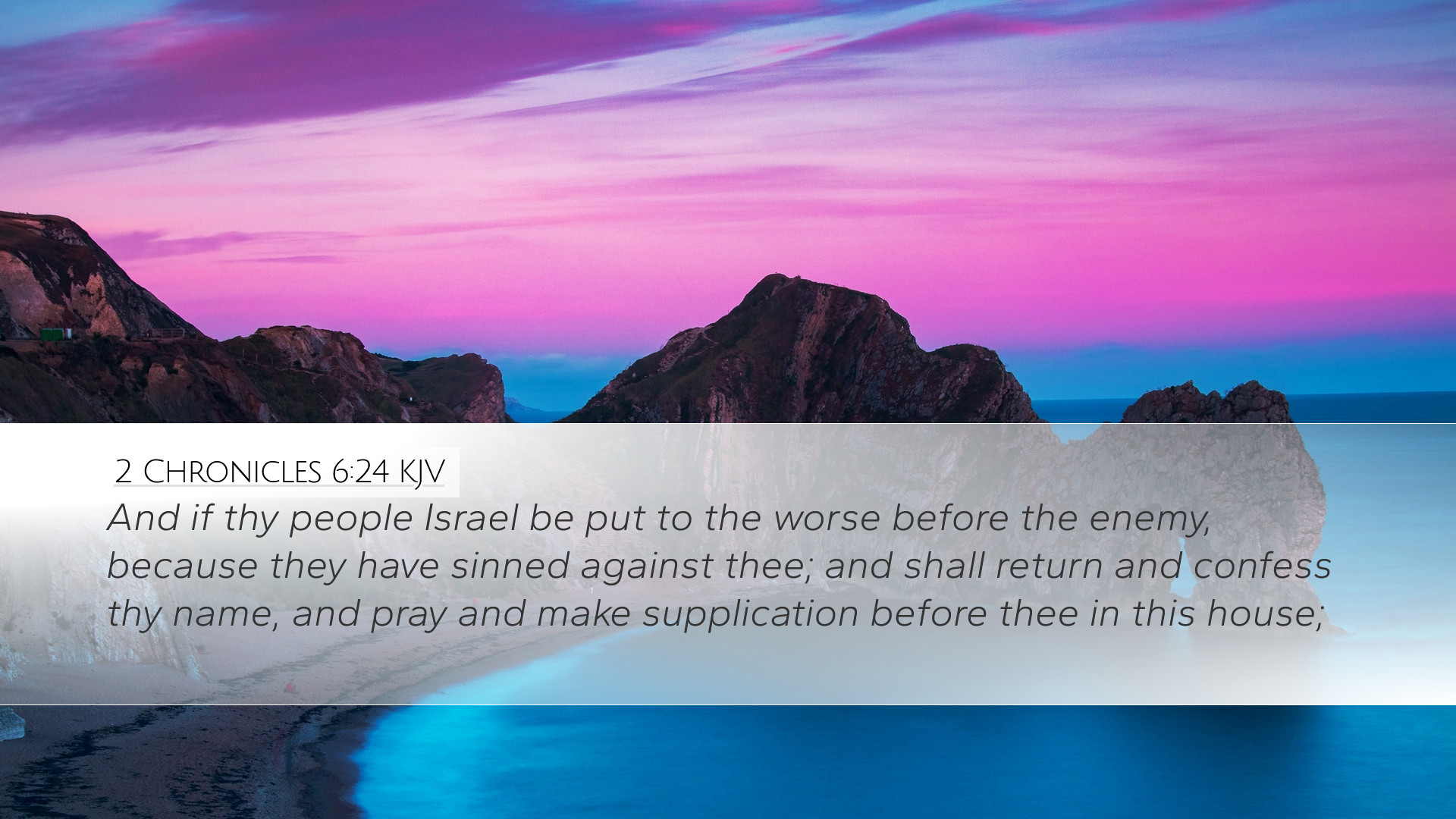Commentary on 2 Chronicles 6:24
Verse: "And if thy people Israel be put to the worse before the enemy, because they have sinned against thee; and shall return and confess thy name, and pray and make supplication before thee in this house."
Introduction
This verse forms part of Solomon's dedicatory prayer at the completion of the Temple in Jerusalem and addresses a critical aspect of Israel’s relationship with God regarding sin and supplication. The importance of repentance and divine forgiveness is highlighted as essential themes for understanding the character of God and His dealings with His people.
The Significance of Repentance
Matthew Henry emphasizes that this verse illustrates the profound principle of divine mercy. When Israel finds itself defeated due to transgressions, it is not an end but a pivotal moment for confession and restoration essential to their covenant relationship with God. The condition placed on Israel reflects God’s hope for His people to turn back to Him in sincerity.
Albert Barnes adds that this verse serves as an acknowledgment of human frailty and the inevitability of sin in the life of the believer. God provides a path toward reconciliation which underscores His readiness to forgive. The events leading to defeat can serve a purpose, compelling the people to return with genuine contrition and seek restoration through prayer.
Context of Divine Discipline
Adam Clarke interprets the notion of being 'put to the worse' as divine discipline reflecting God's governance over Israel. This discipline is restorative; it aims not to punish irreparably but to guide the nation back to a state of blessing. Clarke notes that the acknowledgment of sin often precedes revival and highlights the importance of corporate and individual repentance in the life of the community.
The Role of Supplication
In discussing the act of prayer and supplication, Matthew Henry points out that the petitions made by God’s people in the temple are acts of worship and dependence upon the Lord. These acts signify returning to their foundational covenant with God. Solomon sets an example for future generations, establishing the temple as a central place for reconciliation.
Furthermore, Albert Barnes notes the contextual aspect of the temple as more than a mere physical structure but as a symbol of God’s presence among His people. When Israel prays at the temple, it represents a return to their rightful place in the divine order, reinforcing the significance of community worship and the collective recognition of God’s sovereignty.
Theological Reflections
- God's Justice and Mercy: This verse encapsulates the balance between God’s justice—evidenced in the consequences of sin—and His immense mercy. God allows for failure to bring forth repentance, revealing His character that desires restoration.
- The Importance of the Temple: The reference to the temple serves as a discipline center where God’s people could approach Him. This was a physical reminder of God’s covenant and His terms for communal and individual relationship with Him.
- Covenantal Relationship: The request for forgiveness and the condition of acknowledging their sin reflect the ongoing covenant obligation of Israel. The acknowledgment that sin influences community well-being resonates throughout Scripture.
Practical Applications for Believers
Adam Clarke points out that, in contemporary contexts, believers should be reminded that admitting sin is a pathway to divine mercy. Regular self-examination and honest confession are crucial for spiritual vitality.
Moreover, Matthew Henry encourages the faithful to approach their moments of distress not with despair but rather as opportunities to seek God. In doing so, they unlock the profound reality of divine grace available to all who sincerely plead before Him.
Conclusion
2 Chronicles 6:24 serves as a poignant reminder of the themes of sin, repentance, and God’s readiness to forgive. This narrative woven through Israel’s history is not simply ancient history but offers timeless lessons on the nature of God’s justice and mercy, the necessity for communal confession, and the assurance of restoration. As believers engage with these themes, they are invited into a deeper relationship with God that transcends their failures and embraces His unending grace.


